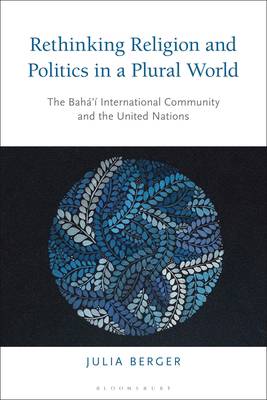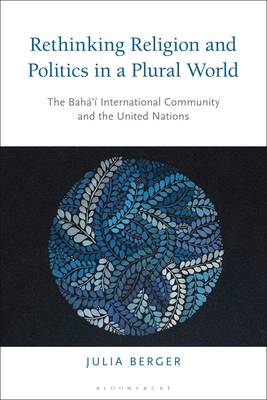
- Afhalen na 1 uur in een winkel met voorraad
- Gratis thuislevering in België vanaf € 30
- Ruim aanbod met 7 miljoen producten
- Afhalen na 1 uur in een winkel met voorraad
- Gratis thuislevering in België vanaf € 30
- Ruim aanbod met 7 miljoen producten
Zoeken
Rethinking Religion and Politics in a Plural World
The Baha'i International Community and the United Nations
Julia Berger
Hardcover | Engels
€ 180,95
+ 361 punten
Uitvoering
Omschrijving
In this book, Julia Berger examines internal meaning-making structures and processes driving NGO behavior, identifying constructs from within a religious tradition that forge new ways of pursuing social change. She evaluates the operation of a distinct rationality, arguing that action is guided not simply by beliefs and values, but also by a combination of elements so intrinsic as to constitute an "organizational DNA." These hidden structures and rationalities manifest themselves in new modes of engagement and agency; they help us to see the pivotal role of religion in shaping notions of peace, progress, and modernity.
To demonstrate the operation and salience of such a rationality, Berger draws on the example of the worldwide Baha'i community. Emerging in 19th century Iran, the community's theological engagement with questions of justice, the unity of humankind, and the emerging global order, constitute one of the most distinct and compelling, yet least-researched examples of religious engagement with the pressing questions of our time. Analyzing events spanning a 75-year period from 1945-2020, this book provides a unique historical and contemporary perspective on the evolving role of religion and civil society in the modern world.Specificaties
Betrokkenen
- Auteur(s):
- Uitgeverij:
Inhoud
- Aantal bladzijden:
- 224
- Taal:
- Engels
Eigenschappen
- Productcode (EAN):
- 9781350130326
- Verschijningsdatum:
- 14/01/2021
- Uitvoering:
- Hardcover
- Formaat:
- Genaaid
- Afmetingen:
- 156 mm x 234 mm
- Gewicht:
- 489 g

Alleen bij Standaard Boekhandel
+ 361 punten op je klantenkaart van Standaard Boekhandel
Beoordelingen
We publiceren alleen reviews die voldoen aan de voorwaarden voor reviews. Bekijk onze voorwaarden voor reviews.







